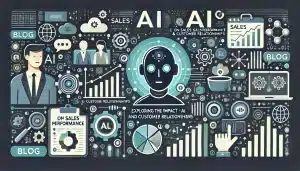Artificial Intelligence (AI) is revolutionizing various aspects of business operations and customer interactions. In the realm of customer relationship management (CRM), AI plays a crucial role in enhancing customer experiences and driving sales performance. This article delves into the profound impact of AI on sales performance and customer relationships, highlighting the innovative ways in which businesses leverage AI technologies.
The Role of AI in Customer Relationship Management
Integrating AI into CRM Systems
Integrating AI into CRM systems enables businesses to streamline processes, gain valuable insights from customer data, and deliver personalized experiences. AI algorithms can analyze vast amounts of customer information to identify trends, preferences, and behaviors, empowering organizations to make data-driven decisions and provide tailored solutions.
Using AI to Improve Customer Relationships
AI tools enhance customer relationships by enabling proactive communication, anticipating customer needs, and providing timely support. By leveraging AI-driven chatbots and virtual assistants, companies can engage with customers round-the-clock, resolve queries efficiently, and deliver seamless experiences across various touchpoints.
Predictive Analytics in CRM
Predictive analytics powered by AI enables businesses to forecast customer behavior, anticipate market trends, and optimize sales strategies. By leveraging predictive models, organizations can identify high-value leads, personalize marketing campaigns, and enhance customer engagement, ultimately driving revenue growth and increasing customer loyalty.
Benefits of Using AI in Customer Interactions
Automating Customer Interactions with AI
AI-driven automation streamlines customer interactions, enabling swift responses to inquiries, efficient order processing, and personalized recommendations. By automating routine tasks and processes, businesses can allocate resources more efficiently, improve operational efficiency, and focus on delivering exceptional customer experiences.
Personalizing Customer Experiences through AI
Personalization is a key aspect of modern customer interactions, and AI plays a pivotal role in delivering tailored experiences. By analyzing customer data, preferences, and behaviors, AI algorithms enable businesses to create personalized product recommendations, targeted offers, and customized communications, fostering stronger customer relationships and enhancing brand loyalty.
Enhancing Customer Satisfaction with AI
AI tools help enhance customer satisfaction by providing speedy resolutions, personalized support, and proactive engagement. By leveraging AI technologies to understand customer sentiments and preferences, organizations can address issues promptly, exceed customer expectations, and cultivate long-lasting relationships built on trust and loyalty.
AI Adoption in Sales and Customer Management
Impact of AI on Customer Data Analysis
The adoption of AI in customer data analysis transforms how businesses extract insights, identify trends, and segment their customer base. AI algorithms can process vast amounts of data at scale, uncover hidden patterns, and generate actionable insights that empower sales teams to make informed decisions, target the right audience, and drive revenue growth.
The Future of AI Technologies in Customer Relationship Management
AI technologies are continuously evolving, offering new possibilities for enhancing customer relationships, predicting customer behavior, and optimizing sales processes. As AI continues to advance, businesses can expect more sophisticated algorithms, predictive capabilities, and automation tools that revolutionize how they interact with customers and drive business growth.
AI’s Influence on Decision-Making Processes in Sales
AI’s impact on decision-making processes in sales is profound, offering valuable insights, predictive analytics, and real-time recommendations to sales teams. By leveraging AI-powered tools for sales forecasting, lead scoring, and performance analysis, organizations can enhance sales efficiency, prioritize sales activities, and achieve better outcomes in an increasingly competitive market.
The Evolution of Customer Experience with AI
AI’s Impact on Customer Satisfaction and Loyalty
AI plays a significant role in shaping customer satisfaction and loyalty through personalized interactions, anticipatory service, and data-driven insights. By analyzing customer feedback, sentiment analysis, and behavioral patterns, AI enables businesses to tailor their offerings, address customer needs proactively, and cultivate a loyal customer base that drives advocacy and repeat business.
Using AI to Analyze Customer Behavior for Insights
AI-driven analytics provide businesses with deep insights into customer behavior, preferences, and engagement patterns. By analyzing customer data across multiple channels, AI algorithms uncover valuable trends, buying signals, and opportunities for cross-selling and upselling, empowering organizations to enhance customer engagement strategies and drive revenue growth.
Data Privacy Concerns in Utilizing AI for Customer Relationships
While AI offers numerous benefits for customer relationships, organizations must address data privacy concerns and ensure compliance with regulations. As AI algorithms leverage sensitive customer data for personalization and predictive analytics, businesses must prioritize data security, transparency, and ethical use of customer information to build trust and maintain long-term relationships.
Exploring the Potential of AI in Evolving Sales Strategies
The Use of Machine Learning in Sales Performance Optimization
Machine learning algorithms enable organizations to optimize sales performance by analyzing historical data, predicting future trends, and automating sales processes. By leveraging machine learning models for sales forecasting, lead scoring, and dynamic pricing, businesses can drive revenue growth, improve sales efficiency, and adapt to changing market dynamics with agility.
Future Research Directions in AI’s Role in Sales and Customer Management
The future of AI in sales and customer management holds promising avenues for research and innovation. As AI technologies evolve, businesses can explore advanced applications such as natural language processing, image recognition, and augmented analytics to enhance customer interactions, personalize offerings, and transform sales strategies for greater effectiveness.
How AI is Reshaping the Customer Engagement Landscape
AI is reshaping the customer engagement landscape by enabling hyper-personalized experiences, predictive insights, and seamless omnichannel interactions. As businesses adopt AI-powered tools for customer engagement, they can anticipate customer needs, deliver tailored recommendations, and foster meaningful connections that drive customer loyalty, advocacy, and sustainable growth.
FAQs
Q: What is the impact of artificial intelligence on CRM?
A: Artificial intelligence has revolutionized CRM by automating tasks, improving customer insights, and enhancing personalization of interactions, leading to better customer satisfaction and increased efficiency.
Q: How is AI used in automating customer relationship management?
A: AI models and algorithms are employed to automate various CRM tasks such as data entry, lead scoring, customer segmentation, and predictive analysis, streamlining processes and enabling more timely and accurate decision-making.
Q: What are some applications of artificial intelligence in CRM products and services?
A: AI is utilized in CRM for sentiment analysis, chatbots, recommendation engines, predictive analytics, customer behavior analysis, and personalized marketing campaigns, improving overall customer experiences and interactions.
Q: How can AI and machine learning be leveraged to enhance customer relationships?
A: By analyzing vast amounts of data, AI and machine learning algorithms can help businesses understand customer preferences, predict future behavior, personalize interactions, and proactively address customer needs, ultimately fostering stronger and more valuable customer relationships.
Q: How has AI integration improved firm performance in CRM?
A: Integrating AI into CRM systems has led to increased operational efficiency, cost savings, faster response times, improved lead conversion rates, higher customer retention, and overall better business outcomes, enhancing firm performance in various aspects.
Q: In what ways has artificial intelligence impacted customer relationships?
A: Artificial intelligence has enabled businesses to better meet customer needs, tailor offerings to individual preferences, deliver more personalized experiences, anticipate customer demands, and provide proactive, timely responses, ultimately enhancing the overall customer relationship.
Q: What are some of the benefits and drawbacks of successful AI adoption in customer service?
A: Successful AI adoption in customer service can lead to improved efficiency, enhanced customer experiences, cost savings, and better decision-making. However, challenges such as data privacy concerns, customer trust issues, and potential job displacement need to be carefully addressed in the process of implementing AI solutions.






